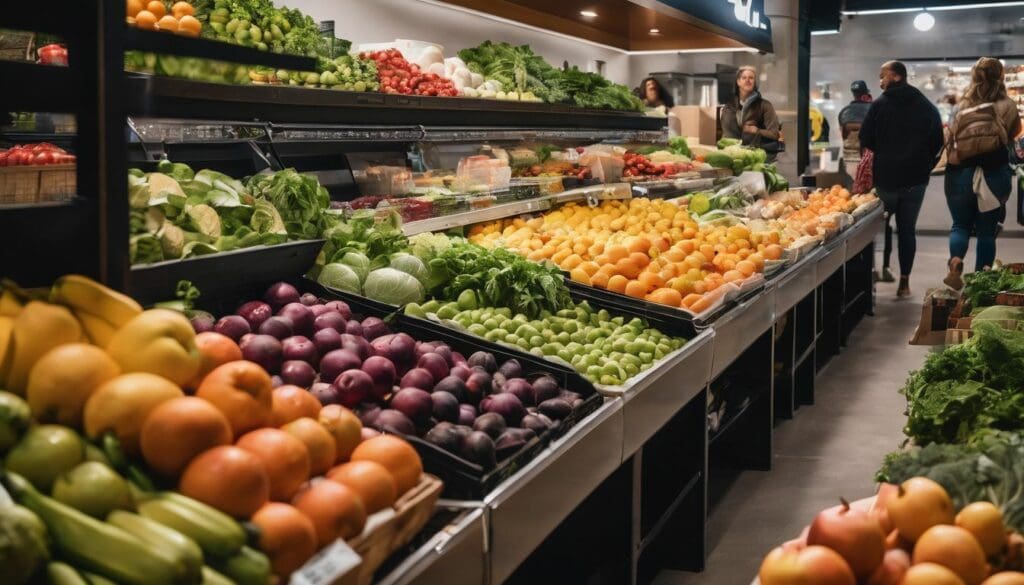Ah, the familiar sight of a fridge brimming with bits and bobs of meals that didn’t quite make it to the dinner table. There’s solace in knowing that it’s not just you; a community awaits on OLIO – an ingenious app dedicated to combating food waste – where over six million souls have gathered, united by their desire to give surplus nosh a second chance.
Our article delves into this marvellous realm of food sharing platforms, celebrating how yesterday’s spaghetti can become today’s act of kindness and tomorrow’s victory for our planet.
Fancy finding out how your leftover lasagne could bolster both neighbourhood spirits and ecological sustainability? Stick with us!
Key Takeaways
- Food sharing apps like OLIO, Too Good To Go, and Karma connect over six million users with surplus food from local businesses, tackling the global issue of food waste which results in 1.3 billion tonnes of wasted food every year.
- By leveraging technology to share and exchange leftover or excess food within communities, these platforms encourage sustainable consumption habits and help reduce environmental impacts such as greenhouse gas emissions by preventing good food from ending up in landfills.
- Individuals can contribute to reducing food wastage in households by planning meals carefully, storing produce correctly, utilising leftovers creatively, composting scraps and checking expiry dates regularly – all steps advocated for within these apps’ frameworks.
- Apps offer various ways to combat food waste including purchasing discounted items approaching their sell-by date through Flashfood or rescuing “ugly” fruits and vegetables via Imperfect Foods’ online subscription service – both methods provide affordable nutrition while reducing production-level waste.
- Participation in these app – based initiatives not only reduces the amount of discarded consumables but also supports community building through shared efforts towards alleviating hunger and fostering a collaborative spirit among neighbours.
The Problem of Food Waste
Food waste is a major issue, with 1.3 billion tons of food being wasted globally each year. This not only has negative environmental impacts, but also contributes to food insecurity in communities around the world.
Statistics on food waste
We understand the gravity of food waste, and it’s shocking to see the numbers laid bare. Here are some stark statistics that highlight the scale of the issue:
| Statistic | Detail |
|---|---|
| Global Food Waste | Approximately one-third of all food produced globally is wasted. |
| Impact on the Environment | Food waste contributes to 8% of global greenhouse gas emissions. |
| Financial Cost | The annual economic loss due to food waste is estimated at $1 trillion. |
| Waste in Households | Households contribute to a significant portion of total food waste. |
| Uneaten Food in the US | Around 40% of food in the United States goes uneaten. |
| Wasted Resources | Wasted food translates to squandered resources, including water, land, and labour. |
| Food Insecurity | While food is wasted, 821 million people worldwide suffer from undernourishment. |
These figures are not just numbers; they represent a call to action. We’re committed to reversing this trend, leveraging technology through food-sharing apps. Together, we can make a significant dent in these numbers, helping our environment and communities flourish.
Impact on the environment
Food sharing apps have a positive impact on the environment by reducing food waste and minimising its detrimental effects. By connecting consumers with surplus and discounted food from restaurants and supermarkets, these apps play a crucial role in preventing edible items from ending up in landfills.
This action helps to decrease greenhouse gas emissions generated by decomposing food waste, contributing to environmental sustainability through waste reduction. Additionally, the promotion of sustainable eating habits through these apps encourages users to adopt more mindful consumption practices, further lessening their overall environmental footprint.
The use of food-sharing apps not only combats food waste but also has wider-reaching benefits for the environment and society as a whole. By encouraging the redistribution of unwanted or excess food within local communities, these platforms help reduce the need for significant resources involved in producing uneaten items while simultaneously fostering community empowerment and engagement around sustainable living initiatives.
Ways to Combat Food Waste
Reducing food waste at home is a simple but effective way to combat the issue. Additionally, purchasing discounted food from restaurants and giving away extra food to those in need are great ways to prevent perfectly good food from going to waste.
Reducing food waste at home
- Plan meals ahead and make a grocery list to avoid overbuying perishable items.
- Store fruits and vegetables properly to extend their shelf life, such as keeping them in the fridge or in a cool, dark place.
- Use leftovers creatively by incorporating them into new recipes or freezing them for future meals.
- Compost food scraps instead of throwing them away, which reduces landfill waste and creates nutrient – rich soil for gardening.
- Check expiry dates regularly and use the oldest items first to prevent food from spoiling.
Purchasing discounted food from restaurants
We can combat food waste by purchasing discounted food from restaurants. It’s an effective solution that allows us to support sustainability and access affordable meals. Here are some popular apps offering this feature:
- Too Good To Go: This app connects users with surplus food from local restaurants and cafes, providing the opportunity to purchase discounted meals that would otherwise go to waste.
- Karma: With Karma, users can discover unsold food from restaurants, bakeries, and grocery stores at reduced prices, helping to reduce food waste while enjoying delicious meals.
- Food for All: This app offers users the chance to buy unsold restaurant meals at a fraction of the original price, contributing to reducing food waste in the hospitality industry.
- Flashfood: Flashfood provides a platform for users to purchase surplus items from supermarkets and restaurants at discounted rates, helping to prevent perfectly good food from being discarded.
- Imperfect Foods: This app offers discounted groceries that are often rejected by traditional retailers due to aesthetic imperfections or excess inventory, reducing food waste at the production level.
Giving away extra food to those in need
To complement the effort of purchasing discounted food from restaurants, another way to combat food waste is by giving away extra food to those in need. Here are some ways individuals can contribute:
- Sharing surplus meals with local shelters or community centres can provide much – needed sustenance for those facing food insecurity.
- Donating excess produce to food banks and organisations dedicated to distributing food to those in need helps ensure that fresh, nutritious items don’t go to waste.
- Connecting with neighbours or local community groups to share leftover groceries or cooked meals can foster a sense of community while preventing food waste.
- Participating in initiatives that allow individuals to share unwanted non – perishable items with those who may benefit from them contributes to sustainable consumption and reduces waste.
Popular Apps for Combating Food Waste
Some popular apps for combating food waste include Too Good To Go, OLIO, Flashfood, Food for All, Karma, and Imperfect Foods. These apps connect users with discounted or surplus food from restaurants and grocery stores, promoting sharing and exchanging food in order to combat food waste and give back to the community.
Too Good To Go
Too Good To Go is an innovative food-sharing app that connects users with surplus food from restaurants and supermarkets at a discounted price. By using this app, individuals can contribute to reducing food waste and improving their communities.
With its easy-to-use interface and vast network of participating establishments, Too Good To Go provides an effective platform for combating food waste while giving consumers access to affordable, high-quality meals.
This app not only benefits the environment but also promotes community support by encouraging individuals to take part in sustainable consumption practices.
OLIO
OLIO is a free food sharing and community network app with over six million users dedicated to reducing society’s food waste problem. It takes a hyper-local approach, allowing users to share unwanted food items with neighbours and local businesses.
By enabling the sharing of leftover or surplus food, OLIO aims to combat food waste at the grassroots level while fostering a sense of community and environmental responsibility. Through its platform, individuals can prevent perfectly good food from ending up in landfills, contributing towards sustainable living and making a positive impact on their communities.
The app operates by connecting users within their local area, encouraging them to offer or collect surplus food items ranging from fresh produce to homemade meals. This innovative approach not only tackles the issue of unnecessary wastage but also fosters interpersonal relationships amongst neighbors, all while promoting environmentally friendly practices.
Flashfood
Flashfood is an app that allows users to buy surplus food from grocery stores at discounted prices, helping to combat food waste while saving money. By offering deals on items approaching their expiry date, the app helps consumers access affordable and sustainable groceries.
With Flashfood, users can browse available products in nearby participating stores and make purchases directly through the app. This not only benefits individuals by providing cost-effective options for purchasing groceries but also contributes to reducing food waste at the consumer level.
The platform’s success in diverting surplus foods from landfills has gained traction and support from various communities and organisations committed to environmental sustainability.
With features that facilitate easy navigation and secure transactions, Flashfood empowers individuals to play a significant role in combating food waste while contributing to community outreach efforts.
Food for All
Food for All is one of the leading food-sharing apps that aims to combat food waste and help communities. With this app, individuals can access surplus meals from restaurants and supermarkets at discounted prices, contributing to reducing food waste and its environmental impact.
By using Food for All, users can actively participate in preventing food waste at both the company and consumer level while also supporting hunger relief efforts and community sharing initiatives.
The app effectively connects users with antiwaste recipes and encourages a sharing economy, fostering a sustainable approach to food consumption.
The Food for All app provides an innovative solution for combating food waste by allowing consumers to purchase leftover meals at affordable rates while making a positive impact on the environment.
Karma
Transitioning from the concept of helping individuals access surplus food, we come to Karma, which introduces a unique approach to reducing food waste. The app creates an opportunity for consumers to purchase excess meals from restaurants and supermarkets at discounted prices, ultimately preventing these items from being thrown away.
Through this process, Karma not only empowers users to make sustainable choices but also supports local businesses in reducing their food waste footprint while creating a positive impact on the environment.
Karma stands out by connecting passionate gamers and novice gamers who are committed to combating food waste with practical solutions that are easy to integrate into their lifestyle.
By engaging with this app, users become part of a community-driven effort that contributes towards greater food sustainability and security while actively participating in charitable donations through purchasing surplus or expiring products.
Imperfect Foods
Transitioning from reducing surplus food from restaurants and supermarkets, Imperfect Foods takes a unique approach to combat food waste. The company sources imperfect or surplus produce directly from farmers and producers, offering it to consumers through an online subscription service.
By rescuing “ugly” but perfectly edible fruits and vegetables that would otherwise go to waste, Imperfect Foods not only reduces food waste at the source but also provides affordable and nutritious options for its customers.
With a focus on sustainability and community impact, Imperfect Foods is contributing to changing the way we think about food consumption and waste while also enhancing access to fresh produce in local communities.
How Do These Apps Work?
These apps work by connecting users with discounted or surplus food, encouraging sharing and exchanging food, and giving back to the community. Curious to learn more about how these apps are making a difference in combating food waste? Keep reading!
Click here to read this blog post now!
Connecting users with discounted or surplus food
Food-sharing apps like Too Good To Go and Karma provide a platform for users to access surplus food from restaurants and supermarkets at discounted prices. Users can purchase meals or groceries that would otherwise go to waste, contributing to the reduction of food waste and its negative environmental impacts.
Additionally, OLIO offers a hyper-local approach by connecting neighbours to share surplus food, reducing waste within communities. These apps not only combat food waste but also enable individuals to make a positive impact on their environment and support local businesses.
Apps such as OLIO encourage sharing and exchanging food among community members, fostering collaboration in tackling society’s food waste problem. By utilising these platforms, passionate gamers and novice gamers alike have the opportunity to contribute to reducing food waste while accessing affordable, high-quality meals or groceries.
Encouraging sharing and exchanging food
These platforms focus on encouraging users to share and exchange surplus or leftover food, allowing individuals to connect with others in their community. By facilitating the sharing of excess food, these apps not only combat food waste but also provide an opportunity for consumers to make a positive impact within their local communities.
Initiatives like Food for All and OLIO aim to boost community spirit by fostering connections between people through the shared goal of reducing food waste and promoting a sustainable environment.
Users can actively engage in sharing food with those in need while also benefiting from discounted meals, effectively promoting a sense of social responsibility among communities. Additionally, these apps provide an avenue for charitable donation through innovative means such as turning food photography into donations, further encouraging participation in combating food waste.
Giving back to the community
Food sharing apps play a crucial role in giving back to the community by providing a platform for individuals and businesses to share surplus food with those in need. By using these apps, users can actively contribute to reducing food waste while making a positive impact on their communities.
Through initiatives like charity donation through food photography and connecting users with discounted or surplus food, these apps not only combat food waste but also help improve access to nutritious meals for those facing food insecurity.
Individuals utilising these platforms can take part in community-driven efforts that promote sustainable living and reduce the social and environmental impacts of food waste, ultimately benefiting local communities.
These innovative solutions not only address the problem of expiring or misshapen foods but also foster a sense of unity within communities as people come together to combat an issue that affects everyone.
Conclusion
In conclusion, food sharing apps play a crucial role in combating food waste and supporting communities. These platforms connect consumers with surplus food and discounted meals, contributing to environmental sustainability.
By participating in these initiatives, individuals can actively make a positive impact on their local community by reducing food waste and helping those in need. With the rise of technology, these apps provide an innovative solution to combatting food waste and promoting sustainable living.
Such initiatives not only benefit the environment but also foster a sense of social responsibility among users.
FAQs
1. What are food sharing apps?
Food sharing apps are mobile applications that allow people to share leftover food, which helps reduce expired food waste and supports community food sharing initiatives.
2. How do these apps help communities?
These apps fight against food waste by connecting those with excess meals to individuals facing food security challenges, thus supporting restaurant meal saving and community efforts.
3. Can businesses use these apps for leftover foods?
Yes, restaurants and other eateries can use these platforms to distribute their surplus dishes through the app’s network, aiding in local food rescue operations.
4. Are there benefits to using a food sharing app if I’m not a business?
Absolutely! Individuals can participate by offering or claiming leftover meals within their neighborhood, improving access to nutrition and fostering community spirit around shared resources.





